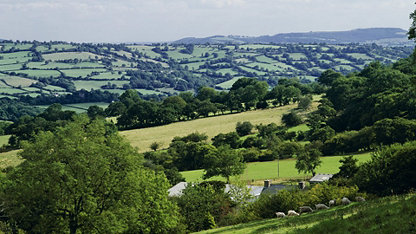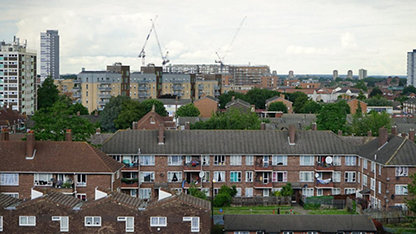Chartered rural surveyor and forester, Rob Gazzard, has worked in fire resilience for more than 20 years and, ahead of this year’s COP26, has shared his insights on the importance of surveyors in building long-term resilience against wildfires in the UK, and the critical role that the profession working in the natural environment play in mitigating against and adapting to the worst effects of climate change.

Rob Gazzard MICF MRICS
“Wildfires create a cycle. If forests or peatlands are destroyed due to fire, then there are fewer trees and peat available to take carbon from the atmosphere, which then means that climate change continues to worsen, which in turn, then creates more wildfires,” said Gazzard. “Further down the line, the destruction of trees means that less sustainable timber is available to meet the demand for infrastructure, which then fuels the reliance for carbon-heavy materials such as concrete, brick, plastic and steel.”
Rural surveyors are at the heart of breaking this cycle.
“Surveyors working in the natural environment must think long-term. Often the adaptations that we recommend may not have an impact in the short-term, but over a number of years or decades, their impact will be felt. Good land management is an investment in time, but the pay-off on that investment will be great for generations to come,” he said.
Although wildfires remain a rare occurrence in the UK, Rob’s work in advising the Government on how we can remain resilient against them is essential, as outlined in the recent report by the Independent Panel on Climate Change, if we don’t act soon, it could be too late.
“We’ve had four major incidents of wildfires in the UK in the past three years, and the acceleration of this is very likely from the evidence. We are now at the point where building resilience is the only solution, as global warming is not going to stop anytime soon.”
The UK is learning from other regions where fires are more common, for example southern Europe, United States, Canada, Australia and New Zealand.
“Extreme weather is one of the most difficult challenges we face in the natural environment, and surveying enables me to understand at what point engineered solutions don’t work. In forestry, solutions such as correct species selection, forest planning and active management are key to building resilience. If instead of thinking of the forest as comprising of trees, if we refer to it as fuel, that underlines the gravity of the situation, if there was to be a fire, then everything is fuel, it’s indiscriminate.”
The role of rural surveyors can also be to offer specialised advice to landowners, for whom their land is their livelihood and may also be their home.
“Businesses must adapt to the inevitable effects of climate change, not only because it is the right thing to do, but also so their business can continue to exist. A rural surveyor’s advice can be the catalyst for changes required for businesses of all sizes to work to build resilience to climate change, by advising on sustainable and resilient materials, for example.” As part of Rob’s work within the Forestry Commission, he has been examining the value of Natural Capital. He points out that the Office of National Statistics estimates that Natural Capital accounts for £1 trillion of assets in the UK. This includes the value of green spaces for a positive social impact, the forest’s and peatland’s in-built ability to sequester carbon, and sustainable timber for building materials.
As Mark Carney, former Governor of the Bank of England said, “If we can place a market price on Amazon, worth $1.5trn…then why don’t we have a dollar value assigned to the Amazon rainforest?”
“The next generation of rural surveyors is at the forefront of these issues,” said Gazzard. “The work I am doing in advising the Government on policies to promote resilience against wildfires will continue to be implemented and adapted by those who are just joining the profession. We have to plan for 2050, and 2080, and so it’s a crucial time to be working in the natural environment, and rural surveying is a profession where you can make a real impact in mitigating against and adapting to climate change. The profession is continuing to evolve to the challenges that we are facing.”
Learn more about the Value of natural capital: the need for chartered surveyors (rics.org).
The RICS will be publishing an updated and expanded guidance note on the valuation of woodlands in Spring 2022.












